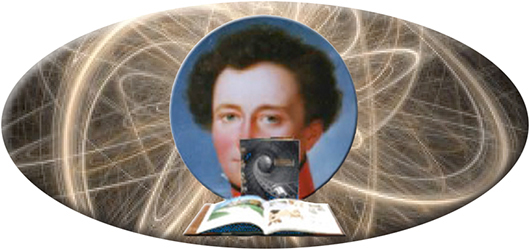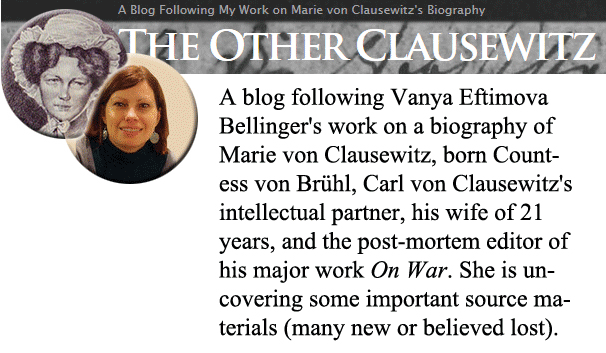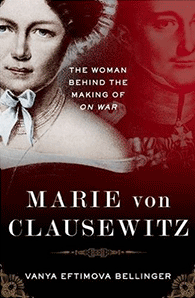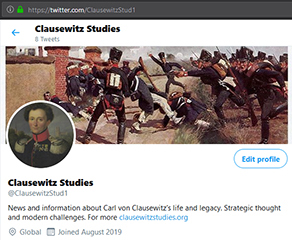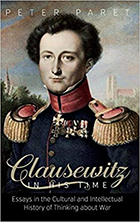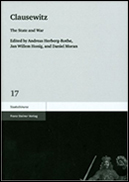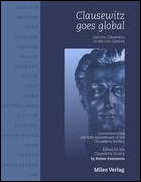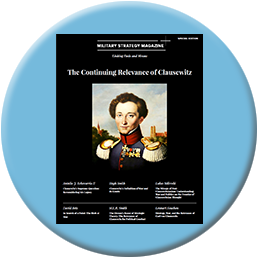The following are links to complete articles, books, and academic papers about Clausewitz or relating to some aspect of his life or work that are available on-line and of particular interest. Most have been published by reputable journals or have been refereed in some other forum. In some cases (e.g., the US Marine Corps doctrinal manual Warfighting), they are items explicitly reflecting the impact of Clausewitz's arguments. See also our comprehensive but unselective English-language bibliography of works by or about Clausewitz's, and other bibliographies in French, German, Japanese, Polish, Spanish/Portuguese, and "other languages"; there is also a bibliography of related works in the nonlinear sciences. For reprints or other copyright permissions, contact the author, publisher, or other copyright holder—or, if you want to use editorial material or articles produced by Clausewitz.com or ClausewitzStudies.org, contact the relevant webmaster. See also Conferences and Workshops and Clausewitz-Inspired Blogs.
• CLICK HERE TO GO DIRECTLY TO THE LIST OF ARTICLES
SEE ALSO:
 THE CLAUSEWITZ STUDIES NEWSLETTER
THE CLAUSEWITZ STUDIES NEWSLETTER
NOTE: The Clausewitz Studies Newsletter, edited by Vanya Eftimova Bellinger, is in a "creative pause." These issues are available.
VOL I (2016): No.1 - No.2 - No.3 - No.4 -
No.5 - No.6 - No.7 - No.8 - No.9
Vanya Eftimova Bellinger, Marie von Clausewitz: The Woman Behind the Making of On War (Oxford University Press, 2015), ISBN: 0190225432.
With the research skills of both a journalist and a serious scholar, Bellinger has done a spectacular job of tracking down sources where no one else had thought to look, in the process recovering some materials thought lost in World War II and others that were previously unknown. This is an important work in the field. Without the efforts of Countess Marie von Clausewitz, Carl von Clausewitz's crucial work on military theory and strategy—On War—would never have been published.
But as historian and Clausewitz scholar Vanya Eftimova Bellinger establishes in this ground-breaking biography of the "other" Clausewitz, Marie was far more than merely a supportive wife who facilitated her husband's legacy. Marie's 1810 marriage to Clausewitz did not make sense to many observers (least of all her mother). She was a wealthy, cultured, and politically engaged young woman from a famous family, one of the highest-ranking non-royals in Prussia. He was a junior Prussian army officer with no particular family or political connections. But the bond between Marie and Carl was forged by love, a deep sense of trust, and a meeting of minds over common political and intellectual interests. Newly discovered archival materials reveal the extent of Marie's influence on her husband, beginning with the very early days of the courtship and lasting until his premature death. The two came to a "collaborative opinion" on many topics, from the moral implications of war to the emotional constitution of true leadership. This biography sheds enormous light on two extraordinary lives and minds, offering the first comprehensive and compelling look at the woman behind the composition of On War. In the process, it gives us a much richer view of her husband's personal evolution and thus of the deeper meaning behind many of his concepts.
Carl von Clausewitz and Arthur Wellesley, 1st Duke of Wellington, On Waterloo: Clausewitz, Wellington, and the Campaign of 1815 (ClausewitzStudies.org, 2010; 2015 bicentennial edition.
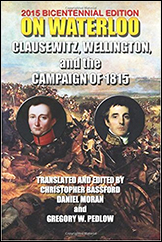 Ed./trans. Christopher Bassford, Daniel Moran, and Gregory W. Pedlow.
Ed./trans. Christopher Bassford, Daniel Moran, and Gregory W. Pedlow.
Published 2010 by ClausewitzStudies.org.
ISBN-10: 1453701508
ISBN-13: 9781453701508
Paperback, 318pp.
List price: $18.00.
Kindle edition US
Kindle edition UK
This book is built around a new and complete translation of Clausewitz's study of the Waterloo campaign (Berlin: 1835), which is a strategic analysis of the entire campaign (not merely the Battle of Waterloo). It includes and analyzes the Duke of Wellington's detailed 1842 response to Clausewitz's study. It contains Wellington's initial battle report; two of Clausewitz's post-battle letters to his wife Marie; correspondence within Wellington's circle concerning Clausewitz's work; Clausewitz's campaign study; Wellington's lengthy memorandum in response; and enlightening essays by the editors. See reviews in The Journal of Military History and War in History.
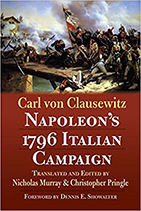 NEW! Carl von Clausewitz, Napoleon's 1796 Italian Campaign, trans. Nicholas Murray and Christopher Pringle (University Press of Kansas, 2018). 352pp. ISBNs: 070062676X, 978-0700626762. Paperback (also available in hardcover).
NEW! Carl von Clausewitz, Napoleon's 1796 Italian Campaign, trans. Nicholas Murray and Christopher Pringle (University Press of Kansas, 2018). 352pp. ISBNs: 070062676X, 978-0700626762. Paperback (also available in hardcover).
On War (Vom Kriege) formed only the first three of ten volumes of Clausewitz's collected writings (and even that collection is incomplete). The other volumes include historical analyses of wars from those of Gustavus and Frederick II to those of the French Revolution and Napoleon. Clausewitz undertook these studies to inform and shape the ideas in Vom Kriege, so they offer invaluable insight into his dialectical, often difficult theoretical masterwork.
Among these historical works is Clausewitz's study of Napoleon's Italian campaign of 1796, a crucial period in the French Revolutionary Wars. During this campaign the young, largely unknown Corsican, in his first important command, led the French Army to triumph over the superior forces of the Austrian and Sardinian Armies. Moving from strategy to battle scene to analysis, this first English translation nimbly conveys the character of Clausewitz's writing in all its registers: the brisk, often powerful description of events as they unfolded; the critical reflections on strategic theory and its implications; and most bracing, the dissection and sharp judgment of the actions of the French and Austrian commanders.
SEE ALSO Murray and Pringle's translations of Clausewitz's Campaign of 1799, volume 1 and volume 2.
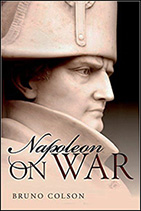 NAPOLEON: ON WAR (Oxford University Press, 2015). By Bruno Colson. 560pp. ISBNs: 0199685568, 978-0199685561.
NAPOLEON: ON WAR (Oxford University Press, 2015). By Bruno Colson. 560pp. ISBNs: 0199685568, 978-0199685561.
In exile on Saint-Helena, Napoleon mused about a great treatise on the art of war, but changed his mind and ordered the destruction of his notes. Thus was lost what would have been one of the most interesting and important books on the art of war ever written. The well known military historian Bruno Colson has spent years researching Napoleon's correspondence and other writings, including especially the copy-book of General Bertrand, the Emperor's most trusted companion on Saint-Helena. Colson's s ground-breaking work has been carefully organized to follow the framework of Carl von Clausewitz's classic On War, allowing a fascinating comparison between Napoleon's ideas and those of his great Prussian adversary and interpreter and highlighting the intriguing similarities between these two founders of modern strategic thought. Regardez l'edition Française.
 Colson's biography of Clausewitz is available, so far, only in French. See Peter Paret's very positive treatment in his extended review of it, "Clausewitz's Life and Work as a Subject of Historical Interpretation," in The Journal of Military History 81 (July 2017), pp.829–837.
Colson's biography of Clausewitz is available, so far, only in French. See Peter Paret's very positive treatment in his extended review of it, "Clausewitz's Life and Work as a Subject of Historical Interpretation," in The Journal of Military History 81 (July 2017), pp.829–837.
Also in French: Benoît Durieux, Clausewitz en France: Deux siècles de réflexion sur la guerre, 1807-2007 (Economica 2008), ISBN: 2717855777.
Clausewitz in His Time: Essays in the Cultural and Intellectual History of Thinking About War (Berghahn Books, 2015.) By Peter Paret. 152pp. ISBN-10: 1782385819. ISBN-13: 978-1782385813.
Clausewitz was anything but a detached theorist—he was as fully engaged in the intellectual and cultural currents of his time as in its political and military conflicts. Late-eighteenth century thought helped shape the analytic methods he developed for the study of war. The essays in this volume follow his career in a complex military society, together with that of other students of war, both friends and rivals, providing a broad perspective that leads to significant documents so far unknown or ignored. They add to our understanding of Clausewitz's early ideas and their expansion into a comprehensive theory that continues to challenge our thinking about war today. Peter Paret, Professor emeritus of the Institute for Advanced Study, is a well known authority on Clausewitz.
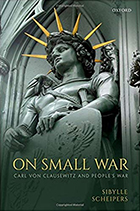 NEW! Sibylle Scheipers, On small war: Carl von Clausewitz and people's war (Oxford University Press, 2018), viii + 174pp., ISBN: 978-0-19-879904-7.
NEW! Sibylle Scheipers, On small war: Carl von Clausewitz and people's war (Oxford University Press, 2018), viii + 174pp., ISBN: 978-0-19-879904-7.
Clausewitz has long been interpreted as the paradigmatic thinker of major interstate war. This book challenges this assumption by showing that Clausewitz was an ardent analyst of small war and integrated many aspects of his early writings on partisan warfare and people's war into his magnum opus, On War. It reconstructs Clausewitz's intellectual development by placing it in the context of his engagement with the political and philosophical currents of his own times—German Idealism, Romanticism, and Humanism. Far from leaving behind his early advocacy of people's war, Clausewitz integrated it systematically into his mature theory of war. People's war was war in its existential form; it risked escalating into 'absolute war.' However, if the threat of defensive people's war had become a standard option of last resort in early-nineteenth century Europe, it could also function as a safeguard of the balance of power. Reviewed by James W. Davis, Contemporary Political Theory (2018). https://doi.org/10.1057/s41296-018-0272-x
BIG-PICTURE TREATMENTS
CLAUSEWITZ
The State and War
Edited by Andreas Herberg-Rothe,
Jan Willem Honig, and Daniel Moran
Stuttgart: Franz Steiner Verlag, 2011
ISBN 978-3-515-09912-7
RECOMMENDED READINGS
Philosophical Journal of Conflict and Violence (PJCV)
Vol. VI (Issue 1/2022), pp.1-109.
Special Issue: "Clausewitz as a Practical Philosopher"
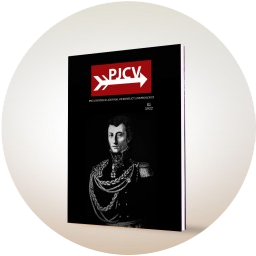
Andreas Wilmes, editor-in-chief; Andreas Herberg-Rothe, issue editor.
ISSN 2559-9798. DOI: 10.22618/TP.PJCV.20226.1 (open access).
CONTENTS
Foreword
Andreas Herberg-Rothe
Philosophy and Methodology in Clausewitz’s Work
Andreas Herberg-Rothe
Abstract: In Clausewitz’s own view his work is akin to a philosophical structure of the art of war. This philosophical structure is most visible in his elaborations concerning the relation between theory and praxis—elaborations which make his work a treatise of practical philosophy. According to him, theory has to: (1) reveal the nature or essence of war; (2) reflect the difference between theory and practice; (3) provide recommendations for military action in war; (4) educate and cultivate the mind of the political and military leaders as well as that of the army; (5) follow the footsteps of Kantian critique. Last but not least, this article also offers an account of Clausewitz’s novel position regarding the dialectical thinking of its time.
Clausewitz’s “Strange Trinity” and the Dysfunctionality of War
Terence M. Holmes
Abstract: By contrast with the Holy Trinity, Clausewitz’s “strange trinity” is an unstable system, whose three “dominant tendencies” compete for mastery over the realm of war. One tendency is the subordination of war to the aims of policy, but that is constantly challenged by the other two—blind hatred and the enjoyment of adventure. The political tendency is the only one that treats war as the function of a purpose beyond war, but only intermittently does that tendency predominate, meaning that war is more often than not a dysfunctional undertaking and always a highly dubious instrument of policy.
The Thoughts of Clausewitz on Society and State in Times of European Upheaval
Andrée Türpe
Abstract: My article focuses on Clausewitz’s actual statements regarding the political changes of his time. It highlights his understanding of the notions of ‘revolution,’ ‘reform,’ ‘monarchy,’ ‘republic’ and ‘nation state.’ Using a concrete historical analysis, I aim to show that the Prussian philosopher of war is best characterized as a supporter of reforms, monarchy and as a representative of national patriotism. In a nutshell, Clausewitz was a supporter of reform in order to prevent revolution or suppress revolutionary inclinations.
Emotions in War: The Emotionality-Rationality Equation in Clausewitz’s Theory of War
Bilgehan Emeklier, Nihal Emeklier
Abstract: Clausewitz introduced an inclusive equation between emotionality and rationality with regards to the debates on the causality and practice of war in modern strategic thought. In Clausewitz’s theory of war, war is a process of governmentality composed by three types of actors: states directing war (leaders and decision-makers), armies executing war (combatants), and people supporting war financially and morally (societies). In this trinitarian scheme, war is a continuous, mutually constitutive interactional process with emotional and rational components both between conflicting parties, and within each side. The aim of this article is to discuss how Clausewitz integrated the emotion-reason equation in his theory of war, to explain through an actor-level analysis how emotions affect, change, and transform war, and lastly to discuss the mutual constitutive relationship between wars and emotions in the contemporary global durable disorder.
Reversing Clausewitz: A History of a Mistake
Guilel Treiber
Abstract: This paper traces the result of the reversal of the Clausewitzian dictum that war is the continuation of politics in post-structuralist political theorizing. I argue that much can be gained by not reversing the dictum (hence, making the reversal a mistake) and retaining the conceptual relation between politics and war Clausewitz espouses. I then show what a neo-Clausewitzian position would contribute to the debate on the relation between war or violence and politics by arguing that, in the case of Clausewitz, it is better to be a Kantian than a Nietzschean.
Clausewitz, Schmitt and the Relationship Between War and Politics in the Interwar Period and Today
Maciej Witkowski
Abstract: Carl von Clausewitz distinguished two fundamental aspects of war — political and existential. These aspects are present in the philosophy of Carl Schmitt too. He used Clausewitz to build a theory of Man and his political nature that also aimed at understanding the German defeat in World War I. In this article, I interpret Schmitt's philosophy as an instance of a modern re-appropriation of Clausewitz's legacy. I aim to show that even though Schmitt’s philosophy might be outdated, his way of reading Clausewitz may be inspiring today. There is a need for a ‘new Schmitt’ who would be able to create a system that would integrate Clausewitz’s intuitions into a modern paradigm.
Accounting for Alliances in Clausewitz’s Theory of War
Olivia A. Garard
Abstract: Allies and alliances are deeply embedded in Clausewitz’s theory of war. Allies are a live and reactive means that may shift throughout a war. Alliances, often responsive to the balance of power, harness allies as a dynamic means. Both problematize Clausewitz’s initial, dual conception of war; they embody uncertainty and inject Politik. To account for allies and alliances entails reevaluating three fundamental Clausewitzian premises: that the defense is the stronger form of war; that the status quo has inertia; and that war has duration. Ultimately, any comprehensive view of Clausewitz’s theory of war demands the inclusion of allies and alliances.
MILITARY STRATEGY MAGAZINE (MSM)
Special Edition: "The Continuing Relevance of Clausewitz" December 2020
William F. Owen, editor
Owen, William F., editor. Special Edition, “The Continuing Relevance of Clausewitz.”Military Strategy Magazine, December 2020.
CONTENTS
William F. Owen, "A Note from the Editor."
Antulio J. Echevarria II [COL, USA (ret.); Professor at the US Army War College and former Elihu Root Chair of Military Studies], “Clausewitz’s Supreme Question: Reconsidering his Legacy,” pages 4-7.
"In this essay, Antulio J. Echevarria II makes a case for including Clausewitz’s 'supreme question' as an integral part of the Prussian’s legacy. The supreme question has not received as much attention as it deserves from scholars, who tend to stress the Prussian’s dictum regarding the primacy of policy; yet it reflects Clausewitz’s overarching emphases on critical inquiry and the importance of analyzing all three of war’s essential elements before entering a conflict."
Lukas Milevski [assistant professor at the Institute of History at Leiden University], "The Mirage of Post-Clausewitzianism: Understanding War and Politics on the Frontier of Clausewitzian Thought," pages 16-20.
"Many have made cases against Clausewitz, often centering on the relationship between war and Politik. Underlying such critiques is the assumption that this relationship has been culturally conditioned. Yet such charges are leveled with no consideration about how the critics’ own understanding of politics/policy is culturally conditioned. Often what is faulty is not Clausewitz, but the critics’ own sense of politics."
David Betz [Professor of War in the Modern World in the Department of War Studies, King’s College London and Senior Fellow of the Foreign Policy Research Institute], “In Search of a Point: The Blob at War,” pages 22-27.
"Clausewitz’s concept of war is fundamentally true. The problem is that the foreign policy establishment of the West, aka ‘the Blob,’ cannot handle the truth. Military force has a very limited range of utility. We should respect it more and use it less."
M.L.R. Smith [Research Associate in the Office of the Dean of Humanities, University of South Africa, Pretoria, South Africa and Professor of Strategic Theory at King’s College London], “The Occam’s Razor of Strategic Theory: The Relevance of Clausewitz for Political Conduct,” pages 28-32.
"While it may be contended that much of Clausewitz’s writings are of limited relevance to contemporary military practice, his injunctions about the relationship between war and policy contain an enduring significance for political conduct more generally, especially in the accentuation of the need to act with proportionality and the problems that are created when this principle is ignored."
Lennart Souchon [former Director of the International Clausewitz-Center at the Führungsakademie der Bundeswehr; founder, the Clausewitz Network for Strategic Studies in 2008; senior member of the International Institute for Strategic Studies (IISS) in London], “Strategy, War, and the Relevance of Carl von Clausewitz,” pages 33-37.
"The article discusses the continued relevance of Clausewitz’s main lines of thought. The author argues that On War introduces five interrelated basic ideas (Hauptlineamente), which offer a timeless method to develop military strategies since they shape how to think rather than what to think about war. Using these lines of thought, the article offers a structured approach to developing a war plan."
♦ INFINITY JOURNAL—edited by A.E. Stahl [Infinity Journal is a free publication but registration is required.]
Alas, Infinity Journal is no longer with us. But Military Strategy Magazine (see listing above) has picked-up the standard (and the archives) and marches on.
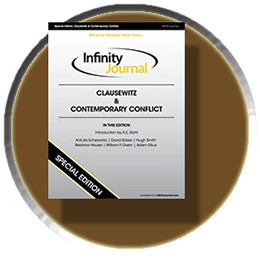
Special Issue: Clausewitz & Contemporary Conflict (February 2012)
CONTENTS
• A.E. Stahl, An Introduction to Clausewitz and Contemporary Conflict
• Antulio J. Echevarria II, Clausewitz's Center of Gravity Legacy. In this article, Antulio J. Echevarria II argues that contemporary military doctrine has made the concept of center of gravity the prerequisite for operational art. But the art really lies in knowing when not to use it.
• Adam Elkus, The Policy-Strategy Distinction: Clausewitz and The Chimera of Modern Strategic Thought. Adam Elkus explains Clausewitz's distinction between policy and strategy and argues for its signal importance in 21st century strategy. It's not just semantics: knowledge and proper application of Clausewitz's ideas about policy and strategy can help military analysts think better about today's security problems, while a poor understanding of the policy-strategy distinction can produce conceptual confusion.
• Beatrice Heuser, Ends, Ways, Means: Clausewitz and Other Prophets. Heuser explains that it is just in the question of how ways and means should be related to (larger political) ends that Clausewitz decided not to furnish larger elaborations of the subject. He himself recognized that a conflict might not be decided permanently by a military victory, but did not want to pursue the subject of how to move from the conduct of war to a lasting peace. This means that On War cannot guide us much further on this subject.
• David Kaiser, Clausewitz and the First World War. Taking issue with writers who have blamed Clausewitz for the First World War, David Kaiser discusses his influence upon the planning for that war but adds that On War should have enabled statesmen and generals to draw more sensible conclusions after a stalemate developed. He then shows how Clausewitz's trinity can explain exactly how that war came to an end.
• William F. Owen, To Be Clausewitzian. What does it mean 'To Be Clausewitzian'? In this article, William F. Owen argues that one must be able to understand the value of Clausewitz's observations and insights in On War, so that they can be utilized for practical guidance and applied in conjunction with sound judgment. He holds that Clausewitzians do not simply study On War out of academic interest alone. While not excluding other important works on war and warfare, it does mean that they use Clausewitz's observations as their start point.
• Hugh Smith, Clausewitz as Sociologist. Hugh Smith argues that Clausewitz's approach to war is imbued at every level with a sociological perspective—from his understanding of the novice soldier going into battle to the impact of social change on the capacity of European nations for war. This sociological dimension, the author suggests, is a major reason for the continuing relevance of Clausewitz's ideas.
♦ CHRISTOPHER BASSFORD
Professor (ret.), National Defense University, Washington, DC, and the Special Warfare Center at Fort Liberty.
"Clausewitz's Categories of War and the Supersession of 'Absolute War.'" This 'working paper,' which is under fairly constant revision based on feedback, examines a number of categories of war either explored by Clausewitz or incorrectly attributed to him by later writers and translators. It discusses the difficulties in categorizing warfare, the evolution of Clausewitz's approach to the problem, and a number of related translation issues. Its central argument is that by far the greatest source of confusion about Clausewitz's book Vom Kriege—other than some very serious infelicities in the English translations, especially the Howard/Paret version—is that the version eventually published after his death by Marie von Clausewitz retained his discussion of "absolute war." The paper argues that Clausewitz had in fact long abandoned that term (which appears exclusively in the first half of Book VIII). The "ideal war" vice "real war" discussion presented in the "Note of 1827," Book I, and the second half of Book VIII, which is normally conflated with the "absolute-war" framework, is in fact a distinctly new and quite different departure. Rather than being simply two different sets of terminology describing the same concept, as scholars have long assumed, the two frameworks are deeply incompatible. Book I thoroughly reassembles the earlier concept's underlying components into a much more powerful framework. Were we to delete the discussions of "absolute war" from Vom Kriege—which we cannot do, of course, since they are entangled with important discussions of other ideas that Clausewitz retained—we would find the work to be much more clear, consistent, coherent, and useful.
"Tiptoe Through the Trinity: The Strange Persistence of Trinitarian Warfare." Working paper. Understanding the trinity is key to understanding how all of Clausewitz's ideas hang together. Understanding the ways in which it has been misrepresented by various popular writers is key to being an effective communicator on the subject. Two rather different (and shorter) published articles have been derived from this working paper: Christopher Bassford, Chapter 4, "The Primacy of Policy and the 'Trinity' in Clausewitz's Mature Thought," in Hew Strachan and Andreas Herberg-Rothe, eds., Clausewitz in the Twenty-First Century (Oxford University Press, 2007), pp.74-90; Christopher Bassford, "The Strange Persistence of Trinitarian Warfare," in Ralph Rotte and Christoph Schwarz, eds. War and Strategy (New York: Nova Science, 2011), pp.45-54.
See also an older piece on this subject:
"Reclaiming the Clausewitzian Trinity." Co-authored with Edward J. Villacres. Parameters, Autumn 1995. [HTML} [Original Parameters PDF]
"Clausewitz and His Works." An extensive introduction to the man, his key writings, and his ideas. Derived from Chapter 2 of Christopher Bassford, Clausewitz in English: The Reception of Clausewitz in Britain and America (New York: Oxford University Press, 1994), this version was written as courseware for the Army War College in 1996 and is periodically updated.
"Clausewitz in America Today." Published in Clausewitz Gesellschaft, Reiner Pommerin, ed., Clausewitz Goes Global: Carl von Clausewitz in the 21st Century [Commemorating the 50th Anniversary of the Clausewitz Society] (Berlin: Carola Hartmann Miles Verlag, 2011), pp.342-356. This is a rather depressed summary of the place of Clausewitz in American Professional Military Education (PME) c.2010.
Policy, Politics, War, and Military Strategy. (ClausewitzStudies.org, 1996-2023). This evolved from Bassford's original draft of MCDP 1-1: Strategy (1997—still current), the US Marine Corps' Strategy manual. (The USMC's published version is Here.)
Clausewitz in English: The Reception of Clausewitz in Britain and America, 1815-1945 (New York: Oxford University Press, 1994). FULL TEXT
"John Keegan and the Grand Tradition of Trashing Clausewitz." War in History, November 1994.
A Response to Bruce Fleming's, 'Can Reading Clausewitz Save Us from Future Mistakes?' The Clausewitz Homepage, 1 March 2004. A shorter version, along with responses from Tony Echevarria and Rutgers University's Professor Michael David Rohr, is here, as is Fleming's somewhat irritated attempt at rebuttal. Last word from The Clausewitz Homepage is here. (Fleming's original piece is listed below.)
Corn, Cracked: A Response to Tony Corn's 'Clausewitz in Wonderland.' September 2006.
A Modest Proposal, an only partly tongue-in-cheek, radical proposal to update Clausewitz for the 3rd Millennium (1999, modified 2006, 2008, 2010).
"Jomini and Clausewitz: Their Interaction." Paper presented to the 23rd Meeting of the Consortium on Revolutionary Europe at Georgia State University, 26 February 1993; slightly edited in June 2000.
"A Word Index to On War." Find that quote you're looking for! A computer-generated index to c.1200 words and phrases in Clausewitz's magnum opus.
♦ VANYA EFTIMOVA BELLINGER
Journalist; Ph.D., King's College, London; Professor, Strategy and Policy Department, U.S. Naval War College; member of the Clausewitz Studies Board; Author of Marie von Clausewitz: The Woman Behind the Making of On War
(New York/London: Oxford University Press, 2015). [email protected] - @vanyaef
“Lieber and Clausewitz: The Understanding of Modern War and the Theoretical Origins of General Orders No. 100.” Journal of the Civil War Era 12, No.1 (March 2022): 28-53.
"A Timid Staff Officer? Reassessing Carl von Clausewitz’s Role in the Battles of Ligny and Wavre (June 16-20, 1815)." The Sword and the Spirit: Proceedings from War and Peace in the Times of Napoleon, Zack White (ed.), Warwick, UK: Helion Publishing, 2021
"When Resources Drive Strategy: Understanding Clausewitz/Corbett’s War Limited by Contingent"
Military Strategy Magazine (formerly Infinity Journal), Volume 7 (Spring 2020): 27- 34.
"The Other Clausewitz: Findings from the Newly Discovered Correspondence between Marie and Carl von Clausewitz." The Journal of Military History 79 (April 2015): 345-367. Posted here with the kind permission of JMH to V.E. Bellinger.
"Carl von Clausewitz’s Obituary from 1831." Blog entry, "The Other Clausewitz," May 14, 2015.
"Archives: What a Letter from Clausewitz Tells Us About the Prussian Master and His World." War on the Rocks, 21 AUG 2015.
"A Portrait of Clausewitz as a Young Officer." War on the Rocks, 23 OCT 2015. Includes a newly-found drawing of Clausewitz made c.1808-1810. Concerns a letter Clausewitz wrote in 1808 to August Wilhelm von Schlegel, a poet and leader of German Romanticism.
"Saving ‘On War’—Marie von Clausewitz’s Forgotten Battle to Preserve Her Husband’s Legacy." MilitaryHistoryNow.com, 13 November, 2015.
"Five Things You Didn't Know About Carl von Clausewitz." The Strategy Bridge, January 5, 2016.
♦ ALAN D. BEYERCHEN
Professor,
Ohio State University.
"Clausewitz, Nonlinearity and the Unpredictability of War," International Security, 17:3 (Winter, 1992), pp. 59-90. (Here's the Abstract.) This article is also available in French: "Clausewitz: Non Linéarité et Imprévisibilité de la Guerre," Theorie, Littérature, Enseignement, 12 (1994), pp165-98. This is perhaps the most important article published on Clausewitz in the past thirty years. That's because nonlinear mathematics and science (of which "Chaos Theory" and "Complexity" are trendy reflections) underlie virtually all modern science. They are what happened when it became routinely possible to apply computer analysis to real-world data in virtually every field. Beyerchen's piece is a splendid introduction to the whole field and also to Clausewitz. But the reader should go on to read more on the actual science. We recommend reading James Gleick, Chaos: Making a New Science, 20th Anniversary edition (New York: Penguin, 2008) and Melanie Mitchell's Complexity: A Guided Tour (New York: Oxford University Press, 2009) before reading anyone's efforts to apply nonlinearity to politics, social science, and history. We make this recommendation because a great many social science, security studies, and historical interpretation of nonlinearity are poorly based in the actual science. Some, however, are very good indeed: See especially John Lewis Gaddis, The Landscape of History: How Historians Map the Past (New York: Oxford University Press, 2004). Understanding these scientific concepts will change your internal model of "how the world works." And once your internal model has adjusted, we think you'll see Clausewitz in a strikingly different light.
"Clausewitz, Nonlinearity, and the Importance of Imagery." Paper delivered at National Defense University, November 1996.
Note: See Clausewitz.com's "Clausewitz and Complexity" section.
[Pamphlet] "Why Metaphors Matter: Understanding the power of implicit comparison and its uses within the Marine Corps." Perspectives on Warfighting Number 5. Quantico, VA, [Date?]. This essay is not particularly about Clausewitz, but it does make some references to him that are interesting in the light of Beyerchen's other relevant work.
♦ ROBERT CASSIDY and JACQUELINE TAME
Robert Cassidy, Ph.D., is a U.S. Army Colonel who formerly taught strategy at the U.S. Naval War College. Jacqueline Tame is an intelligence professional with the Defense Intelligence Agency; she recently graduated from the U.S. Naval War College senior course.
"The Wages of War without Strategy, Part I: Clausewitz, Vietnam, and the Roots of Strategic Confusion." War on the Rocks, January 5, 2017. This article appears to be the first of a planned series by these writers. This is an excellent discussion, highly recommended. We are a bit puzzled, however, by the phrase "imbalance in the trinity." We can probably attribute this to the poor translation of the trinity concept in Howard/Paret, On War (p.89). The whole point of the trinity as an analytical concept—as opposed to the prescriptive rule it often gets turned into—is that the various forces it encapsulates are always in shifting, dynamic interaction with one another. "A theory that ignores any one of them or seeks to fix an arbitrary relationship among them [e.g., "balance"] would conflict with reality to such an extent that for this reason alone it would be totally useless."
♦ CHICAGOBOYZ
The Chicagoboyz Clausewitz Roundtable is a free-for-all web discussion of Clausewitz. The discussants don't claim any particular expertise, and this is not the place to start learning about Clausewitz. However, if you are familiar with Clausewitz, and particularly if you are interested in teaching other people about Clausewitz, this discussion can tell you a lot about the ways in which Clausewitz comes across to intelligent, energetic seekers-after-truth who have not seriously encountered him before.
Here's a useful backgrounder by ChicagoBoyz discussant Joseph M. Guerra, "The Clausewitz Roundtable at Chicagoboyz."
See also ZenPundit, two discussions on Clausewitz's Trinity: One and Two.
♦ BRUNO COLSON
University of Namur, Belgium. Homepage.
"Clausewitz for Every War," War in History, 18(2) [2011], pp.249-261. This is an insightful review essay covering:
Clausewitz's Puzzle: The Political Theory of War. By Andreas Herberg-Rothe. Oxford University Press. 2007. 208 pp. ISBN 978 0 19 920269 0
Carl von Clausewitz's On War: A Biography. By Hew Strachan. Atlantic. 2007. 256 pp. ISBN 978 1 84354 391 6
Clausewitz and Contemporary War. By Antulio J. Echevarria. Oxford University Press. 2007. 264 pp. hbk. ISBN 978 0 19 923191 1
Clausewitz in the Twenty-First Century. Edited by Hew Strachan and Andreas Herberg-Rothe. Oxford University Press. 2007. 328 pp. ISBN 978 0 19 923202 4
Clausewitz en France: deux siecles de reftexion sur la guerre 1807-2007. By Benoit Durieux. Economica. 2008. 861 pp. ISBN 978 2 7178 5577 7
The Cognitive Challenge of War: Prussia, 1806. By Peter Paret. Princeton University Press. 2009. 176 pp. ISBN 978 0 691 13581 6
 Colson, a very well known Belgian historian of the Napoleonic Wars, is also the author of a recent French-language biography, Clausewitz (Paris: Perrin, 2016). See the very positive review by Peter Paret, "Clausewitz's Life and Work as a Subject of Historical Interpretation," in The Journal of Military History 81 (July 2017), pp.829–837. Colson's ground-breaking book Napoleon: On War (Oxford University Press, 2015) has been carefully organized to follow the framework of Carl von Clausewitz's classic On War, allowing a fascinating comparison between Napoleon's ideas and those of his great Prussian adversary and interpreter.
Colson, a very well known Belgian historian of the Napoleonic Wars, is also the author of a recent French-language biography, Clausewitz (Paris: Perrin, 2016). See the very positive review by Peter Paret, "Clausewitz's Life and Work as a Subject of Historical Interpretation," in The Journal of Military History 81 (July 2017), pp.829–837. Colson's ground-breaking book Napoleon: On War (Oxford University Press, 2015) has been carefully organized to follow the framework of Carl von Clausewitz's classic On War, allowing a fascinating comparison between Napoleon's ideas and those of his great Prussian adversary and interpreter.
See also Colson's review of On Waterloo: Clausewitz, Wellington, and the Campaign of 1815.
♦YOURI CORMIER
Youri Cormier is Executive Director of CDA Institute (formerly The Conference of Defence Associations) in Canada. He formerly served in research roles with the Canadian Department of National Defence and the NATO Parliamentary Assembly, having completed a PhD in War Studies at King's College London. His book on dialectical war theory, War as Paradox: Clausewitz and Hegel on Fighting Doctrines and Ethics, was published by McGill Queens University Press in 2016.
"Fighting Doctrines and Revolutionary Ethics," Journal of Military and Strategic Studies, Vol. 15, Issue 1, 2013. Article Abstract: The expression 'Clausewitz connection' has become the standard go-to term for showcasing how keen many Marxists were in citing and applying ideas from On War to their revolution. That being said, the 'connection' has often been exaggerated. Azar Gat made this case effectively by digging up the original exchanges between Marx and Engels and showing they were by no means devout Clausewitzians, even though they read and commented on at least sections of his book, Vom Kriege. The error among scholars has been to expect a connection based on methodological affinities alone. A closer scrutiny reveals that while their methodology had similarities, it was not the methodology that mattered. In fact, the way the revolutionaries cited Clausewitz was strategic, but shallow and far removed from method. Instead, what becomes clear is that the ethical dimension of Clausewitz best explains where and how the revolutionaries linked up with his system, and more importantly where they broke away. To arrive at this conclusion, one must consider the surprising fact that while the Communists were indeed citing Clausewitz, albeit not as much as has been claimed, their Anarchists co-revolutionaries in the anti-bourgeois movement were not citing him at all. Their fighting doctrines were instead tied up closely with Hegel. This exclusive relationship tells us something about how the two groups understood the ethics of political violence—as 'instrumental' in the Clausewitzian tradition, or as a 'right' in the Hegelian tradition—and how this complicated the integration of Clausewitz into communist doctrine and made him altogether irrelevant to anarchist doctrine.
"Hegel and Clausewitz: Convergence on Method, Divergence on Ethics." The International History Review, on-line 16 JAN 2014. DOI: 10.1080/07075332.2013.859166. Article Abstract: "The Hegelian influence in Clausewitz has far more often been stated than it has ever been qualified, quantified, or verified. Perhaps the error was to try to ‘prove’ such a link, rather than focus on what such a convergence consists of and what it means, regardless of how it happened. Using both a historical and a linguistic argument, this essay delineates early writings that are devoid of any Hegelian similarities from those later in Clausewitz's life where a convergence of ideas becomes manifest. A counterpoise to Raymond Aron's overall dismissal of the link between the two authors, this article nonetheless reaches a limit as well: though they agreed in many ways in their methodology, the two fathers of the ‘dialectical war theory’ diverged quite dialectically on ethics. Hegel understands war as an inherently justified ‘right’ of the state, while Clausewitz sees it rather as the neutral ‘instrument’ of a moral agent, the state. The author traces this divergence to a missing link: a foundational aspect of Hegel's method regarding the nature of subjectivity and objectivity is absent from Clausewitz's work, and this appears to generate the impasse. The essay provides grey tones to arguments on either side of the debate about influences, or lack thereof, which have strayed too far into shades of black and white."
♦ TONY CORN
US Department of State.
"Clausewitz in Wonderland" (in the Hoover Institution's Policy Review, "web special," September 2006)
EXCERPT: "If a Colin Gray—arguably the smartest living Clausewitzian today—can be so blind as to the nature of the challenges facing the West, one can easily guess the damage done by Clausewitzology on less talented minds."
Despite the poor logic revealed in the excerpt above, this is an interesting piece. For some reason, Corn has chosen to pretend that Carl von Clausewitz is behind the scientific, historical, and anthropological ignorance, the political naiveté, and the smothering political correctness that underlie the remarkably dysfunctional national strategic culture that the United States displayed throughout the era of the G.W. Bush administration. This article may be a clever critique of that strategic culture or merely a particularly poignant example of it.
The Clausewitz Homepage responds HERE.
♦ PAUL CORNISH
Formerly Director, Centre for Defence Studies,
Kings College, London.
"Clausewitz and the ethics of armed forces," Journal of Military Ethics, 2003, Vol 2, pp. 213-27. Posted to The Clausewitz Homepage by permission of Taylor & Francis AS.
Abstract: The work of Carl von Clausewitz continues to provoke heated debate. For some scholars, Clausewitz's On War remains indispensable to serious thought on the resort to war in the modern period. Others, however, see Clausewitz's work as either outdated, or a morally repellent argument for unlimited, unrestrained and brutal warfare. This essay argues not only that Clausewitz's work continues to be relevant to discussions on the use of armed force, but also that On War provides a framework for ethical reflection on war and its conduct. Two main preoccupations of western military academies and staff colleges—Clausewitz on the one hand, and the just war tradition on the other—can complement, rather than rival each other. On War creates a space for reflection on the use of armed force, and for that reason if no other, should still be considered an important resource for contemporary students and practitioners of strategy.
♦ GEORGE DIMITRIU
Netherlands Armed Forces; PhD candidate of Utrecht University and a research fellow at the Netherlands Defence Academy.
"Clausewitz and the politics of war: A contemporary theory." Journal of Strategic Studies, published online: 15 Oct 201. DOI: 10.1080/01402390.2018.1529567. And HERE. From the Abstract: "This paper re-examines the theoretical underpinnings of Strategic Studies, proposing a novel theory and a new framework for analyzing war's fundamental relationship with politics in line with the Clausewitzian tradition. Throughout modern history, Clausewitz's concept of politics has been misconstrued as referring only to policy whereas in fact, for him, 'politics' was a much broader concept, including domestic power struggles. The political logic of war is defined here as the convergence of the interrelating factors of power struggles and policy objectives within a given polity that restrains and enables these political forces."
♦ PAUL DONKER
Paul Donker studied philosophy at the University of Amsterdam. He served as an infantry officer in the Royal Netherlands Army and is currently a lecturer in military strategy at the Netherlands Defense Academy. He is working on a doctoral dissertation on the genesis of Clausewitz's classic work, Vom Kriege.
NEW: Paul Donker, "The Evolution of Clausewitz's Vom Kriege: a reconstruction on the basis of the earlier versions of his masterpiece," trans. Paul Donker and Christopher Bassford, ClausewitzStudies.org, August 2019. This is a translation of Paul Donker, "Die Entwicklung von Clausewitz' Vom Kriege: Eine Rekonstruktion auf der Grundlage der früheren Fassungen seines Meisterwerks" (here is a PDF), in the Clausewitz-Gesellschaft's Jahrbucher 2017, 14-39. The 2019 English version reflects some additional research and some new discoveries made since 2017.
In this work, Donker has produced an extremely interesting description of the precise manner in which the text of Vom Kriege (On War) evolved between 1816 and 1834. Understanding this process is important for any serious investigation into its meanings and imperfections.
See as well Paul Donker, "The Genesis of Clausewitz's On War Reconsidered," British Journal for Military History, Volume 2, Issue 3, July 2016, pp.101-117.
An important supporting document is Donker's "108 Research Paper, Aphorismen über den Krieg und die Kriegführung as the first version of Clausewitz's masterpiece: A textual comparison with Vom Kriege," a publication of the Faculty of Military Sciences, Netherlands Defence Academy, May 2016. Download PDF from URL: https://hbo-kennisbank.nl/details/sharekit_nlda:oai:surfsharekit.nl:5043ae2a-3641-48a4-ac78-46c27199d7c9. This paper discusses a list of 177 aphoristic statements that was published as Carl von Clausewitz, "Aphorismen über den Krieg und die Kriegführung," Zeitschrift für Kunst, Wissenschaft und Geschichte des Krieges, Band 28, Viertes Heft 1833—Band 35, Siebentes Heft, 1835. Donker argues convincingly that this publication was taken from a significantly older manuscript. If the latter proves to be the case, it will challenge the existing conventional wisdom concerning the writing of Clausewitz's most famous work.
♦ BRIAN DROHAN
Captain, US Army.
"Carl von Clausewitz, His Trinity, and the 1812 Russian Campaign, Part 1. " The Journal of Slavic Military Studies, Volume 19, Number 2, June 2006, pp. 295-341; Part 2 appears in Volume 19, Number 3, September 2006, pp.515–542, 2006. Posted to The Clausewitz Homepage with the permission of the editors of The Journal of Slavic Military Studies.
♦ ANTULIO J. ECHEVARRIA II
LTC, US Army (ret.), Ph.D. (Princeton), Strategic Studies Institute, Carlisle, PA. Editor of Parameters.
"Clausewitz's Center of Gravity Legacy." In this article, Antulio J. Echevarria II argues that contemporary military doctrine has made the concept of center of gravity the prerequisite for operational art. But the art really lies in knowing when not to use it. Infinity Journal, February 20-12.
"Reconsidering War's Logic and Grammar." Infinity Journal, Spring 2011.
"On the Clausewitz of the Cold War: Reconsidering the Primacy of Policy in On War." Armed Forces & Society, October 2007 vol.34 no.1, pp.90-108.
Echevarria II, Antulio J., "7 Principles of Strategy," Clausewitz and Contemporary War (Oxford, 2007; online edn., Oxford Academic, 1 Jan. 2008). https://doi.org/10.1093/acprof:oso/9780199231911.003.0011
"Clausewitz's Center of Gravity: It's Not What We Thought." Naval War College Review, Winter 2003, pp.108-123.
"Clausewitz's Center of Gravity: Changing Our Warfighting Doctrine—Again!" Strategic Studies Institute, September 2002. Over the last 30 years, the center of gravity concept has grown increasingly central to the U.S. military's warfighting doctrine. This monograph cuts through the myriad interpretations surrounding the concept and returns to the original idea as conceived by Carl von Clausewitz. In doing so, the author reveals that Clausewitz intended the center of gravity to function much as its counterpart in the mechanical sciences does—as a focal point. He argues that the Clausewitzian center of gravity is not a strength, nor a weakness, nor even a source of strength, but rather the one element within a combatant's entire structure or system that has the necessary centripetal force to hold that structure together. This is why Clausewitz wrote that a blow directed against a center of gravity will have the greatest effect. The monograph concludes with recommendations for revising Joint and Service doctrine so that they will reflect a more accurate and coherent definition of a center of gravity. [If the primary URL is unavailable, click HERE for backup copy.]
"Borrowing from the Master: Uses of Clausewitz in German Military Literature before the Great War," War in History, 3 (July 1996)
"War and Politics: The Revolution in Military Affairs and the Continued Relevance of Clausewitz," Joint Forces Quarterly (Winter 1995-96)
"Clausewitz: Toward a Theory of Applied Strategy," Defense Analysis, Vol 11, No. 3, (1995).
See also Tony's books, After Clausewitz: German Military Thinkers before the Great War (University Press of Kansas, 2000) and Clausewitz and Contemporary War (Oxford University Press, 2007).
♦ BRUCE FLEMING
Professor of English, US Naval Academy.
"Can Reading Clausewitz Save Us from Future Mistakes?," Parameters, Spring 2004, pp. 62-76. [local backup] Another effort to expose Clausewitz's essential foolishness.
See also Christopher Bassford, "A
response to Bruce Fleming," The Clausewitz Homepage, 1 March 2004. A shorter
version, along with responses from Tony Echevarria and Rutgers University's
Professor Michael David Rohr, is here,
as is Fleming's somewhat irritated attempt at rebuttal. Last word from The Clausewitz Homepage is here.
♦ BRETT FRIEDMAN
Captain, USMC
Friedman, Brett [Captain, USMC]. "Creeping Death: Clausewitz and Comprehensive Counterinsurgency." Military Review, January-February 2014, pp.82-89. Criticizing both the 'population-centric' school of counterinsurgency and the view that seeking out and destroying the insurgents' fighting forces is the counterinsurgent’s path to success, Friedman argues that both approaches "are built on an inaccurate idea of the center of gravity concept and a misunderstanding of Clausewitz’s theory as a whole. Both ideas assume a predictable, static relationship between the enemy, the civilian population, and the insurgency itself.... [It] is Clausewitz who offers the most insight into insurgencies, and his ideas reveal that a more comprehensive method is required for successful counterinsurgency.... This essay points out that the analytical reductionism inherent in both ideas has clouded the theories as well as the practice of counterinsurgency. It does so with a focus on third party support to host nations that are fighting an insurgency, also referred to as Foreign Internal Defense.... [W]hile counterinsurgency is a specific type of warfare, it is still war and thus subject to the same immutable and timeless forces as any other war. American unfamiliarity with counterinsurgency and the wounds of Vietnam blinded us to this fact. It is past time we take off the blinders."
♦ OLIVIA A. GARARD
[Student, St. John's College.] Garard served as an active duty officer [Captain] in the U.S. Marine Corps from 2014 to 2020. She is currently investigating to what extent we can understand the phenomenon of warfare through the mind of the commander in Carl von Clausewitz’s On War. BA in philosophy from Princeton University in Princeton; MA in war studies from King’s College London UK. Clausewitz tends to bind her motley thoughts together.
"Down the Rabbit Hole: Alice and the Experience of Clausewitzian Genius," The Strategy Bridge, 4 FEB 2016.
“Uniqueness as Flexibility: Refining Strategic Narrative,” The Strategy Bridge, March 17, 2016.
"The Threatening Space Between Napoleon and Nukes: Clausewitz vs. Schelling," RealClear Defense, August 24, 2016.
"Reestablishing the Relationship Between Tactics and Politics," The War Room [USAWC], August 20, 2020.
An Annotated Guide to Carl von Clausewitz’s Theory of the Combat (Marine Corps University Press, Quantico, Virginia, 2021). LCCN 2021011565 | ISBN: 9781732003132. (PDF) (Kindle). Review: Clausewitzian Deep Tracks: #Reviewing “Guide to Tactics, or the Theory of the Combat,” The Strategy Bridge, 3 MAR 2020. This is a review of “Guide to Tactics, or the Theory of the Combat” [AKA "Leitfaden zur Bearbeitung der Taktik der Gefechtslehre," an appendix to Vom Kriege], Carl von Clausewitz. trans. Colonel J. J. Graham. On War [original publication date 1873] (New York, NY: Barnes and Noble Inc., 2004).
"Accounting for Alliances in Clausewitz’s Theory of War," In Andreas Wilmes (editor-in-chief) and Andreas Herberg-Rothe (issue editor), Special Issue: "Clausewitz as a Practical Philosopher," Philosophical Journal of Conflict and Violence (PJCV), Vol. VI (Issue 1/2022), pp.92–109. Abstract: "Allies and alliances are deeply embedded in Clausewitz’s theory of war. Allies are a live and reactive means that may shift throughout a war. Alliances, often responsive to the balance of power, harness allies as a dynamic means. Both problematize Clausewitz’s initial, dual conception of war; they embody uncertainty and inject Politik. To account for allies and alliances entails reevaluating three fundamental Clausewitzian premises: that the defense is the stronger form of war; that the status quo has inertia; and that war has duration. Ultimately, any comprehensive view of Clausewitz’s theory of war demands the inclusion of allies and alliances."
"Some Clausewitzian Thoughts on the Ukrainian Defense," Modern War Institute [USMA, West Point], 25 APRIL 2022. Urban Warfare Project commentary: "Much of the analysis on the Russian invasion of Ukraine has focused on the Russians. Why did analysts overestimate the strength of the Russian forces? Why is the Russian military performing so poorly? Why did Vladimir Putin miscalculate? The list goes on. This article seeks to answer none of these questions. Instead, it sets out to reorient focus onto the Ukrainians. In doing so, it reveals a fundamental reason why they have been successful so far: because they have been fighting on defense."
"Clausewitz’s 'Artikel' on Art: An Introduction," Classics of Strategy and Diplomacy, September 30, 2023.
Ed./trans, Clausewitz, Carl von, “On Art and the Theory of Art,” Classics of Diplomacy, September 28, 2023. CSD Editor’s Note: “Über Kunst und Kunsttheorie” is an Artikel or essay by Carl von Clausewitz, written at some point after a trip to Paris [as a privileged POW] in 1807. In her Introduction, Olivia Garard provides context, interpretation, and insight into Clausewitz’s thinking about art and the connections between those thoughts and his famous teachings in On War. The essay ... is an original translation by Garard, marking the first time to our knowledge that it has appeared in the English language.
♦ NIKOLAS GARDNER
Professor at the Air War College, Maxwell AFB, AL.
"Resurrecting the 'Icon': The Enduring Relevance of Clausewitz’s On War," Strategic Studies Quarterly, Spring 2009, pp.119-133. A very capable response to Phillip Meilinger's "Busting the Icon: Restoring Balance to the Influence of Clausewitz," Strategic Studies Quarterly (Fall, 2007), pp.116-145 (listed below). Many thanks, Nik: You have spared The Clausewitz Homepage the task of swatting this particular fly.:-)
♦ COLIN S. GRAY
Late Professor of International Politics and Strategic Studies at the University of Reading, England.
"Clausewitz Rules, OK? The Future is the Past—with GPS." In Michael Cox, Ken Booth, and Tim Dunne, eds., Interregnum: Controversies in World Politics, 1989-1999. Cambridge: Cambridge University Press, 1999, 161-182. If that link is broken, try this link.
"Defining and Achieving Decisive Victory." Carlisle, PA: Strategic Studies Institute, April 2002. In this post-9/11 monograph, Gray explores the concept of victory in the war in terrorism, but he does so by placing it within the larger currents of change that are sweeping the global security environment. He contends that the time-tested idea of decisive victory is still an important one, but must be designed very carefully in this dangerous new world. To do so correctly can provide the foundation for an effective strategy. To fail to do so could be the first step toward strategic defeat. Though this is not an essay specifically on Clausewitz, Gray—as usual—explicitly utilizes Clausewitzian ideas and shows how they apply in the evolving strategic environment. [If the primary URL is unavailable, click HERE for backup copy.]
"Clausewitz, History, and the Future Strategic World," prepared for the Strategic and Combat Studies Institute Conference "Past Futures," Royal Military Academy, Sandhurst, 3-4 July, 2003 and Marine Corps Command and Staff College, Quantico, VA, USA, 9-10 September, 2003. Strategic and Combat Studies Institute Occasional Paper No 47.
♦ JOSEPH M. GUERRA
"An Introduction to Clausewitzian Strategic Theory: General Theory, Strategy, and their Relevance for Today." Infinity Journal, no.65, VOL.2, ISS.3.
Also by Joe Guerra:
"The Clausewitzian Concept of Cohesion as a Theory of Political Development" (Paper)
"Martin Luther King, American Strategist: A Clausewitzian Analysis," blog entry, 24 March 2010.
♦ J. BRYAN HEHIR
Counselor, Catholic Relief Services, and Professor, Harvard Divinity School.
"The Uses of Force in the Post-Cold War World"
Excerpt: "[T]here were two people who taught the Western world to think about politics, strategy, and ethics. They were a strange combination—a 19th century Prussian general and a 5th century African saint. It was Clausewitz and Augustine that helped us to relate politics, strategy, and ethics." This is a presentation delivered on June 3, 1996, at a conference at the Woodrow Wilson Center.
*On the topic of Just War theory as a practical theory of statecraft, with some meaningful references to Clausewitz, see also George Weigel, "Moral Clarity in a Time of War," the Second Annual William E. Simon Lecture, Thursday, October 24, 2002. [Posted on the "Ethics and Public Policy Center" website.]
♦ ANDREAS HERBERG-ROTHE
Dr. habil.habilitatus Andreas Herberg-Rothe is a lecturer in social and cultural studies at the Fulda University of Applied Sciences and is conducting research on the war theory of Carl von Clausewitz, among others.
NEW. "Clausewitz und Sun Tzu: Paradigmen der Kriegführung im 21. Jahrhundert." Bundeswehr website, 25 OCT 2023. Summary: This short article starts with very short summarizations of Clausewitz's and Sun Tzu's strategic approaches. It then describes the changes in the two thinkers' appeal—i.e., their military-intellectual fashionability—over time, with particular reference to the post-Cold War era up to today's Russo-Ukrainian War. It correctly notes that Sun Tzu is generally seen (and as Liddell Hart portrayed him) as a "limited war" thinker. In fact, however, Sun Tzu's wars are driven by existential threats to the opponents—the strategic issue is which one will survive. His political objective, at least, is therefore, ipso facto, the annihilation of his opponent, though he always seeks to avoid the danger and expense of directly seeking the annihilation of his enemy's military forces. This is true wisdom, of course. But in practice its pursuit against a genuinely capable opponent is more than a bit awkward. Herberg-Rothe's conclusion is that, in reality, both approaches—which are not nearly as diametrically opposed as his opening summaries would imply—are valid. The wise strategist takes a "both/and" rather than an "either/or" approach to drawing on these two geniuses' ideas.
"Clausewitz or Sun Tzu: Re-Claiming the primacy of policy," The Peninsula Foundation (India), 24 MAR 2021.
"The Concept of Honor in War." World Security Network (on-line), 18 January 2012. Excerpt: "It is well known that for the tribes in Afghanistan and Pakistan and in FATA the concept of honor is of greatest importance. The young Clausewitz shared this outlook, despite his markedly different social background. In order to understand the dynamics of fighting for one's honor, it is worth looking back at Clausewitz's reaction to the Prussian defeats at Jena and Auerstedt (1806) which he personally experienced as a junior infantry officer and, for a time, as a prisoner of war."
"Clausewitz’s 'Wondrous Trinity" as a Coordinate System of War and Violent Conflict," International Journal of Conflict and Violence, Vol. 3 (2) 2009, pp. 204 – 219.
"Carl von Clausewitz today—the primacy of politics in war and conflict." World Security Network Newsletter, reporting from Berlin, February 21, 2009.
"Ein Preuße in den USA." Europäische Sicherheit, October 2003. See rough translation, "A Prussian in the United States."
"Clausewitz's 'Wondrous Trinity' as General Theory of War and Violent Conflict," Theoria 54 (114), pp.48-73. This essay is an extended and revised version of a lecture of the same name given at the Gewaltlast (Burdens of Violence) Congress at the University of Zurich in 2005, and at the University of Hildesheim in 2003.
"Primacy of Politics or Culture in a Modern World? John Keegan's Critique Demands a Sophisticated Interpretation." Defense Analysis, Volume 2, August 2001.
♦ TERENCE M. HOLMES
Professor (ret.), Swansea University, UK.
"Planning versus Chaos in Clausewitz's On War" The Journal of Strategic Studies, Vol. 30, No. 1 (February 2007), pp.129–151.
(Posted to The Clausewitz Homepage with permission of the publishers.)
Holmes takes on some writers who argue that Clausewitzian theory is somehow inimical to practical military planning. This excellent exploration of the subject of planning in On War may somewhat miss the point of Alan Beyerchen's brilliant nonlinear interpretation of Clausewitz. But that's a good subject for debate.
♦ BARON ANTOINE-HENRI DE JOMINI
French-Swiss writer on military affairs, 1779-1869.
See bibliographical listings/links for Jomini.
If you're a Jomini fan, Clausewitz.com has lots of pictures of him.
"The Present Theory of War and Its Utility." Preface to Jomini's Summary of the Art of War (1838).
Jomini is frequently portrayed as Clausewitz's most influential competitor as a military theorist and, misleadingly, as his "opposite." This essay is reproduced (with minor changes) from the 1854 American translation of Jomini's The Art of War, trans. Major O.F. Winship and Lieut. E.E. McLean (New York: Putnam, 1854). It is a somewhat clumsy translation and a bit difficult to read, which is probably why it has been entirely superseded by the better 1862 Mendell/Craighill translation. Unfortunately, the latter translation omits this revealing essay on the state of military theory as Jomini perceived it around 1838. A close reading of this essay will reveal both overt sneers at Clausewitz and many adaptations to the arguments made in On War.
♦ DAVID KAISER
Professor of Strategy, US Naval War College.
"Back to Clausewitz." Journal of Strategic Studies, vol.32, no.4 (August 2009), pp.667-685.
This excellent review essay on Hew Strachan, Clausewitz’s On War, A Biography (New York: Atlantic Monthly Press), 2007; Antulio J. Echevarria II, Clausewitz and Contemporary War (Oxford: Oxford University Press, 2007); Hew Strachan and Andreas Herberg-Rothe, eds., Clausewitz in the Twenty-First Century (Oxford: Oxford University Press, 2007) covers a great deal of the current debate among serious Clausewitz scholars in the US and UK.
♦ JUSTIN KELLY and MIKE BRENNAN
"Looking For The Hedgehog Idea." Australian Army Journal, Volume VII, Number 1, pp.41-56; reprinted Small Wars Journal, 13 OCT 2010.
See a full ClausewitzStudies.org response here, including an extended discussion with Infinity Journal's Wilf Owens.
This is a clever and interesting piece. The Clausewitz Homepage, however, is more interested in its discussion specifically of Clausewitz, and this is problematic. On that subject it commits some of the usual absurdities, in this case pretending that Clausewitz was a "hedgehog" (a term that has been applied to Clausewitz by others, notably Isaiah Berlin), used here to describe him as a simplistic thinker with "one big idea"—i.e., that the sole objective of war was the destruction of the enemy's forces. We really do not know why otherwise sensible people like to misread and/or misrepresent Clausewitz in this manner. It does not really bother us that it's shallow; our expectations are not, after all, very high. But it does bother us that it's so unproductive. The conduct of war varies dramatically in accordance with the political context. We (should) know that. And Clausewitz definitely did know that and say that. What is the value of pretending otherwise? In any case, Clausewitz worked with a great many "big ideas," and the one mentioned isn't anywhere near the top of the list in importance. His usefulness lies primarily in his understanding, not of any individual concept, but of the ways in which these concepts and realities related to one another.
♦ EUGENIA C. KIESLING
Professor of History, United States Military Academy, West Point.
Review of Jon Tetsuro Sumida, Decoding Clausewitz: A New Approach to On War (University Press of Kansas, 2008), Army History, Summer 2010, pp.46-48. This is a thoughtful, witty, and balanced book review that actually offers a good handle on the issues under dispute: "Decoding Clausewitz is fun, elegant, thought-provoking, and sometimes convincing. [Sumida's] description of On War 'as a set of instructions on how to engage in serious learning of a highly personal nature rather than an impersonal representation of the totality of that which is to be learned' is as intelligent an explanation of the book as one is likely ever to read. Those of us who teach military history in an effort to educate soldiers will find in Decoding Clausewitz an inspiring explanation of what we ought to be doing."
"On War Without the Fog." Military Review, September-October 2001, pp.85-87. "Like most useful military concepts, 'fog of war' normally is attributed to Clausewitz, who receives credit for the alliterative 'fog and friction'—friction referring to physical impediments to military action, fog to the commander's lack of clear information. The only problem with this neat formula is that he neither uses fog of war nor gives fog significant weight in his argument."
♦ STEVE LEONARD
Senior Fellow at the Modern War Institute at West Point; co-founder of the national security blog Divergent Options and the podcast The Smell of Victory, "and the creative force behind Doctrine Man!!"
Steve Leonard, "That Clausewitz-is-Irrelevant 'Hot Take' isn't Blasphemous. It's Just Wrong." Modern War Institute (USMA), 5 MAR 2019.
"'You Really Think I'm Irrelevant? LOL.' A Letter to Clausewitz Haters from Beyond The Grave," West Point: Modern War Institute, USMA, 6 May 6 2020. This is a very useful little essay, but we also found the illustration interesting. The Clausewitz on the left is the original from a portrait commissioned by the Clausewitz Gesellschaft in 1999, based on the then-missing 1830 portrait by Wilhelm Wach and presented to the Führungsakademie of the German Bundeswehr that year. But someone has gone through a lot of trouble to alter the eyes and mouth to make Clausewitz look much sterner and tougher—i.e., the way "someone like him" ought to look (vice the man the artist on the spot actually perceived). Altering an historical image for such a purpose is not legitimate.
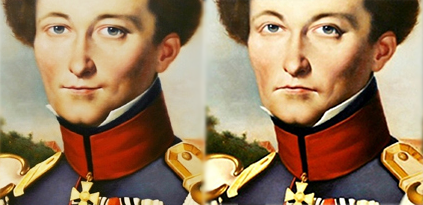
♦ TIMOTHY McCRANOR
(Extracted from IWP bio.) MA in Statecraft and National Security Affairs from the Institute of World Politics; Strategic Communications Analyst/Arabic Linguist (two years); Ph.D. in poli-sci at Boston College, primary field political philosophy; dissertation entitled "Rousseau, Arendt, and the End of Politics"; edited book, Science Fiction and Political Philosophy; as of 2020 on IWP staff as an academic advisor.
"On the Pedagogical Intent of Clausewitz's On War." MCU Journal vol. 9, no. 1, Spring 2018, pp.133-154.
♦ WALTER RUSSELL MEAD
James Clarke Chace Professor of Foreign Affairs and Humanities at Bard College and Editor-at-Large of The American Interest magazine.
"Clausewitz: Master of War." The American Interest, May 17, 2011. This is on "Via Meadia," Mead's Blog.
Discusses teaching about Clausewitz at Bard College. "Clausewitz's unfinished masterpiece On War stands out as perhaps the greatest work of strategic thought human reflection has yet produced."
♦ PHILLIP S. MEILINGER
Colonel, USAF (ret.).
"Busting the Icon: Restoring Balance to the Influence of Clausewitz," Strategic Studies Quarterly (Fall, 2007), pp.116-145. [See backup copy here.]
This is a critique of the use and misuse of Clausewitz in Western military thought generally and by the US military in particular. It is similar in some respects to other recent critiques by Tony Corn and Bruce Fleming (also listed on this page), and contains plenty of arguable propositions (as well as some classic bits of hoary Airpower theology).
The Clausewitz Homepage would have responded "at a time and place of our choosing," but Nik Gardner's capable "Resurrecting the 'Icon': The Enduring Relevance of Clausewitz’s On War," Strategic Studies Quarterly, Spring 2009, pp.119-133 (also listed above), has saved us the trouble.
♦ WALTER RUSSELL MEAD
James Clarke Chace Professor of Foreign Affairs and Humanities at Bard College and Editor-at-Large of The American Interest magazine.
"Clausewitz: Master of War." The American Interest, May 17, 2011. This is on "Via Meadia," Mead's Blog.
This piece discusses teaching about Clausewitz at Bard College. "Clausewitz's unfinished masterpiece On War stands out as perhaps the greatest work of strategic thought human reflection has yet produced."
♦ CHRISTOPHER MEWETT
Military analyst, strategist, and support contractor to the U.S. Department of the Army.
"J.J. Graham: A Biographical Sketch." Written to support ClausewitzStudies.org's posting of COL J.J. Graham's 1873 translation of Clausewitz's Vom Kriege.
"Clausewitz: The Fighting Soldier." Review of Donald Stoker, Clausewitz: His Life and Work (New York: Oxford University Press, 2014), ISBN 0199357943. War on the Rocks, August 26, 2014.
"Ain’t No Party Like a Clausewitz Party Cuz a Clausewitz Party Don’t Stop." War on the Rocks.
Part I: "Defining War for Law and Theory," March 5, 2014.
Part II: "Technology and the Expansion of War," March 10, 2014.
Part III: "Strategy, Politics, and Keeping “War” Limited," March 12, 2014.
"Understanding War’s Enduring Nature Alongside its Changing Character." War on the Rocks, January 21, 2014.
♦ DANIEL MORAN
US Naval Postgraduate School.
"Strategic Theory and the History of War." Paper, 2001. A short (17pp) survey of the development of strategic theory from its emergence in the 17th century through the era of the World Wars.
♦ RALPH PETERS
LTC US Army, (ret.), journalist and author.
"The New Strategic Trinity," Parameters, Winter 1998
Like Steve Metz's article (above), this piece seems to argue for Clausewitz's obsolescence. Instead, as some behind the scenes discussion reveals, Peters' comments on Clausewitz reflect the writer's need for a provocative "hook" assailing Clausewitz and his conviction that this is a harmless fiction, since no one understands Clausewitz properly anyway.
♦ JULIAN REID
In 2003, Department of Political Studies, School of Oriental and African Studies, University of
London: email : [email protected]
"Foucault on Clausewitz: Conceptualizing the Relationship Between War and Power," Alternatives 28 (2003), 1-28.
♦ WILLIS G. REGIER
Director, University of Illinois Press.
"The Essence of War: Clausewitz as Educator," review article, The Chronicle of Higher Education, August 3, 2009.
"Clausewitz was a general, yes, but he spent most of his career as an educator. He was tutor to a prince, a teacher of cadets, director of a military academy, and a gifted military historian. He wanted to write a war book of a much higher order than existing maxims and manuals, a book that would combine experience, historical examples (the more recent the better), and exact analysis in a clear and emphatic fashion. A careful scholar, Clausewitz revised drafts of his books again and again, On War among them.... "Disputes about Clausewitz—Is he vicious? Contradictory? Obsolete?—heat up the scholarship about him. His attackers (like the military historians Martin van Creveld, B.H. Liddell Hart, and John Keegan) have been met with fierce defense and counterattack by younger scholars (Christopher Bassford, Antulio J. Echevarria II, Andreas Herberg-Rothe, Hew Strachan), who seem to be winning."
♦ CLIFFORD ROGERS & JON SUMIDA
Professors, USMA and U. Maryland, respectively.
Here's an argumentative but reasonably civilized exchange between two scholars on the meaning of some important ideas in Clausewitz's On War.
Jon Tetsuro Sumida, “The Relationship of History and Theory in On War: The Clausewitzian Ideal and its Implications,” Journal of Military History, April 2001
Cliff Rogers, "Clausewitz, Genius, and the Rules," The Journal of Military History, October 2002
Jon Sumida replies to Cliff Rogers, The Journal of Military History, October 2002
♦ BART SCHUURMAN
"Clausewitz and the 'New Wars' Scholars," Parameters, Spring 2010, pp.89-100. "[The New Wars theorists] arguments for Clausewitz's dismissal are of a highly contested nature. By a closer examination of the criticisms leveled at Clausewitz, this article aims to show that instead of validating the new wars theory, Clausewitz in fact exposes its fundamental flaws. First of all, though, a brief review of several leading new wars theorists will illustrate the theory and some initial pitfalls.
ClausewitzStudies.org writes: "This is an excellent survey and critique of various recent efforts to dismiss Clausewitz as irrelevant to war in the current era—e.g., the work of Mary Kaldor, Martin van Creveld, John Keegan, etc., etc. Kaldor is Professor of Global Governance and Director of the Civil Society and Human Security Research Unit at the London School of Economics. Her "Purple Patch: Total Wars," The Daily Times ("A new voice for a new Pakistan"), 16 JAN 2000, was an intelligent piece, reflecting a more nuanced understanding of Clausewitz than is reflected in Kaldor's more recent discussions (see below), which are profoundly confused—not so much about what is going on in many contemporary wars but in her grasp of how they compare to historical warfare and how her understanding lines up against Clausewitz's." See also:
Mary Kaldor, "Five Books," thebrowser.com, c.8 March 2010. Kaldor lists and describes her top five books about war. Not a bad selection, but we have no idea why she bothered to list Clausewitz's On War. The man sounds like an idiot.
Mary Kaldor, "Reconceptualising War," OpenDemocracy.net, 24 February 2010. Kaldor's problem appears to be that her own private Clausewitz has mutated from being a real mind with a specific set of ideas into a straw man label for "war as some people imagine it must have been practiced in the early 20th century." The connection escapes us. One might attempt to explain Kaldor's presentation as a desperate effort to leverage the historical delusions of ignorant policymakers to manipulate them into making better policy and strategy. That way lies madness.
See also Mary Kaldor, "In Defence of New Wars," Stability: International Journal of Security & Development 2(1) (2013), Page/Article: Art. 4. DOI: https://doi.org/10.5334/sta.at. She argues that "new wars" are "post-Clausewitzian because new wars are not 'contests of wills' but more similar to a mutual enterprise." The same could be of course be said for, say, the wars of European kings in the late 17th and 18th centuries. Most politics involves such con jobs. The fact remains that the phrase "New Wars" cannot describe a valid category of warfare. The intensive unrealism and ahistoricism of Kaldor's "New Wars" thinking (not to mention its surprisingly un-PC Eurocentricity) is well displayed on the "Global Sociology" website's page entitled "War": "So, when Clausewitz defined war—structured armed conflict—he had in mind the interstate wars, that is, wars that appeared in the 19th century between states whose national armies (either popular through draft or composed of professional servicemen) face each other on the battlefield.... New wars are related to globalization and the end of the Cold War. New wars are also global as in transnational and they are a globalizing force." Hmmnnnnn.... Sounds like politics.
♦ A.E. STAHL (editor, Infinity Journal)
Stahl, A.E., "Viable Targets? Hamas Centers of Gravity," Infinity Journal, Volume 3, Issue No. 2, Spring 2013, pages 9-12. [Infinity Journal is a free publication but registration is required.]
ClausewitzStudies.org does not wish to encourage the long-standing and frequently absurd doctrinal debate concerning the "Center of Gravity"—a term that appears in English translations of Clausewitz's Vom Kriege but is seldom treated in a manner that reflects his own approach to theory. But the debate exists and frequently invokes Clausewitz's name, so we must give it air-time. Infinity Journal provides an energetic forum for discussions of strategic matters and is as good an arena as any to thrash this subject out.
Abstract: In this Infinity Journal article, A.E. Stahl briefly examines Hamas' centers of gravity (CoG), as defined by Carl von Clausewitz, during the 2000-2005 Second Palestinian Armed Rebellion. It questions, among others, where Hamas' CoGs resided and whether they were immune from or susceptible to military force, or whether such centers were even worth the cost of striking them. Stahl holds that during the armed rebellion, there were four possible CoGs. He concludes, however briefly, with an understanding that Hamas' CoG was most likely their armed force. However, this was one CoG that Israel either could not or chose not to destroy.
♦ HEW STRACHAN and RUTH HARRIS
Hew Strachan is perhaps the most prominent military historian in today's Great Britain and one of the planet's most influential commentators on Clausewitz.
Ruth Harris is Research Group Director, Defence and Security, RAND Europe.
"The Utility of Military Force and Public Understanding in Today's Britain,” Santa Monica, CA: RAND Corporation, 2020. Downloadable for personal use. https://doi.org/10.7249/RRA213-1
Research Question: What do the conflicts of the last 30 years reveal to us (the general public and current political generation) about the changing dynamics of the Clausewitzian Trinity (focusing on the "secondary trinity"—i.e., the "people/army/government" sociopolitical model that Clausewitz used in illustrating the primary idea), and what does this say about the utility of force in the 21st Century?
♦ JON SUMIDA
Professor, U. Maryland. See also his controversy with Cliff Rogers, above.
"On Defense as the Stronger Form of War” (draft, 15 March 2005). Paper delivered at the University of Oxford, March 2005. This key Clausewitzian concept has never been extensively described or discussed in English. In fact, in the notoriously bad Penguin edition, one of the most widely available English-language abridgements of On War, Book 6, "Defense"—by far the largest book in the entire work—has been entirely edited out. That editorial act reflects at least in part the assumption that Clausewitz, allegedly the "High Priest of Napoleon," etc., must have been kidding when he argued that the defender, all other things being equal, holds inherent advantages.
"The Clausewitz Problem," Army History, Fall 2009, pp.17-21. This is a short, well-crafted, and useful précis of Sumida's controversial arguments in his recent book, Decoding Clausewitz: A New Approach to On War. Lawrence, KS: University Press of Kansas, 2008. The controversy, to a large extent, involves Sumida's style, perhaps excessively exclusive claims, and details of his treatment of "absolute war." His core arguments, which concern 1) the nature and meaning of Clausewitz's views on the inherently superior strengths of the defensive form of war, and 2) Clausewitz's ideas concerning the use of historical reenactment in military-strategic education, are innovative, important, and sound. See, however, Jennie Kiesling's thoughtful, witty, and balanced review, listed above.
Special Interest
Efstratia Sygkellou — Ευστρατία Συγκέλλου, University of Ioannina (Greece)
"Clausewitz and War in Late Byzantium"
ClausewitzStudies.org, 23 JAN 2021. Originally published as "Ο Clausewitz και ο πόλεμος στο ύστερο Βυζάντιο," Byzantiaka 34 (2017), 247–263.
How could the political, military, and historiographical theories of the Napoleonic-era Prussian soldier-scholar Carl von Clausewitz (1780–1831) possibly be of relevance for our understanding of Byzantium's wars in the period between the Fourth Crusade and the Ottoman conquest of Constantinople in 1453?
♦ UNITED STATES MARINE CORPS DOCTRINE
FMFM 1: Warfighting (1989) (HTML) [c.118Kb]
Click to view on-line the following publications, all of which draw heavily on Clausewitz.
• MCDP 1: Warfighting (1997)
• MCDP 1-1: Strategy (1997) [See the Original Draft, by Chris Bassford.]
• MCDP 1-2: Campaigning (1997)
Other US military doctrine can be found at the Defense Technical Information Center (DTIC).
See also Christopher Bassford, "Doctrinal Complexity: Nonlinearity in Marine Corps Doctrine."
♦ THOMAS WALDMAN
University of York. [Homepage]
"War, Clausewitz, and the Trinity," Ph.D. dissertation, Department of Politics and International Studies, University of Warwick, June 2009. Recommended. Now significantly revised and published as War, Clausewitz and the Trinity (Farnham: Ashgate, 2013), ISBN 9781409451396
"This study is an attempt to analyse Clausewitz’s central theoretical device for understanding war—the ‘remarkable trinity’ of politics, chance, and passion. It aims to present a more accurate conception and one which is truer to Clausewitz’s intentions." One particularly endearing line: "It has been written that, 'in order to avoid ... endless misunderstanding, On War ‘has to be studied repeatedly, seriously, and in depth.' The irony that this was written by one of Clausewitz’s most mistaken interpreters [i.e., Martin van Creveld] should not detract from the wisdom of the injunction."
SEE ALSO:
"Clausewitz as Creative Director," e-International Relations, 2013. This is a response to John Arquilla, "Real Genius: Does the Pentagon need a creative director," Foreign Policy, 25 FEB 2013.
"Clausewitz and the Study of War," Defence Studies, Volume 12, Issue 3, 2012.
*" Politics and War: Clausewitz’s Paradoxical Equation." Parameters, Vol. 40, No. 3 (Autumn 2010). This is a truly excellent exploration of the meaning of the most quoted—and most frequently misunderstood—concept in On War.
"Shadows of Uncertainty: Clausewitz's Timeless Analysis of Chance in War," Defence Studies, Volume 10, Issue 3, 2010.
♦ RODRICK WALLACE
Rodrick Wallace provides us a model of for interdisciplinary research. A research scientist at the New York State Psychiatric Institute, Wallace received a B.S. in mathematics and a Ph.D. in physics from Columbia University, and was subsequently tutored in ecosystem analysis by his wife, Deborah N. Wallace. With the latter he collaborated on two books—The Collapse of Fire Service in New York City 1972-1976: Impacts of Pseudoscience on Public Policy (1978) and A Plague on Your Houses: How New York City Was Burned Down and National Public Health Crumbled (1998). In 2013, he received an Investigator Award in Health Policy Research from The Robert Wood Johnson Foundation. He has published many papers adapting quantitative methods from population, community, and ecosystem ecology to the theoretical and empirical analysis of problems of public health and public order. More recently he has attempted to adapt methods from information theory to the study of evolutionary process in medical sociology, biology and economics.
Emails: [email protected]; [email protected].
** Carl von Clausewitz, the Fog-of-War, and the AI Revolution: The Real World Is Not A Game of Go (Springer, 2018). ISBN: 3319746324. The language of business is the language of dreams, but the language of war is the language of nightmare made real. Yet business dreams of driverless cars on intelligent roads, and of other real-time critical systems under the control of algorithmic entities, have much of war about them. Such systems, including military institutions at the tactical, operational and strategic scales, act on rapidly-shifting roadway topologies whose ‘traffic rules’ can rapidly change. War is never without both casualties and collateral damage, and real-time critical systems of any nature will inevitably partake of fog-of-war and frictional challenges almost exactly similar to those that have made warfare intractable for modern states. Into the world of Carl von Clausewitz, John Boyd, Mao Tse-Tung, Vo Nguyen Giap, and Genghis Khan, come the brash, bright-eyed techies of Alphabet, Microsoft, Amazon, and Uber who forthrightly step in where a phalanx of angels has not feared to tread—but has trod very badly indeed. This book applies use cutting-edge tools from information and control theories to examine canonical and idiosyncratic failure modes of real-time cognitive systems facing fog-of-war and frictional constraints. In sum, nobody can ever navigate unscathed the landscapes described by Clausewitz.
* Cognitive Dynamics on Clausewitz Landscapes: The Control and Directed Evolution of Organized Conflict (Springer, 2020). ISBN: 3030264262. This book applies cutting-edge methods from cognitive and evolutionary theories to develop models of conflict between hierarchically-structured cognitive entities under circumstances of imprecision, uncertainty and stress. These were characterized as friction and the fog of war by the Prussian military theorist Carl von Clausewitz. Such conditions impair institutional cognition in real-time conflict and pose a real and continuing threat to organizations such as the US military. In a linked collection of formal essays and a mathematical appendix, the book explores different aspects of cognitive and evolutionary process as conducted under the direction of doctrine, which acts as a kind of genome for retention of what is learned through Lamarckian evolutionary selection pressures: that is, armies and corporate entities learn from conflict and incorporate that learning into their ongoing procedures. A central feature of the book is a formal description of the famous OODA loop of the US military theorist John Boyd in terms of the Data Rate Theorem that links control and information theories. A scientifically sophisticated exercise in applied mathematics, history, evolutionary theory, and ecosystem theory, this book is appropriate for researchers and students interested in defense, security, and international relations, as well for as non-academic career professionals in government and industry.
* "On Maskirovka: the dynamics of delay in threat recognition," Journal of Defense Modeling & Simulation, April 2023. doi:10.1177/15485129211061688. Abstract: "Across military Zweikampf and public health, error, blindness, and incompetence carry singular burden. Here, we adapt methods developed for the analysis of pandemic mismanagement to the study of armed conflict. Stability of control during such conflict depends on prompt recognition of, and response to, rapidly changing events. In addition to ‘conventional’ Clausewitzian fog and friction, there are almost always inherent or induced delays to threat recognition. For a system to be stable without such delay, there will be a critical lag at which control fails, as it similarly does if institutional cognition sufficiently degrades. In such cases, tactical thrashing becomes manifest. In a military context, there is no way around such dynamics, which are routinely—often brilliantly—exploited.
* "Military scientism and its discontents," The Journal of Defense Modeling and Simulation," 2022;19(4): 613-623. doi:10.1177/15485129211014281. Abstract: "The asymptotic limit theorems of control and information theories allow the examination of systemic failures afflicting “scientific” approaches to armed conflict such as reflexive control, the OODA loop, and East Asian alternatives. Large-scale combat, like other major human enterprise, is a form of dialog between cognitive institutional entities only loosely following shifting “laws” that most often express a path-dependent historical trajectory constrained by powerful cultural riverbanks. Such “conversations,” while having their own grammar and syntax, can involve matters of science, engineering, and technology, but they are not, of themselves, scientific in the Western sense. They may, however, be studied using the methodologies of historiography, social science, human ecology, and the like. Moving much beyond this is to invoke an alternate reality."
♦ BARRY D. WATTS
Senior Fellow, Center for Strategic and Budgetary Assessments
Clausewitzian Friction and Future War
(National Defense University: McNair Paper Number 52, October 1996; revised as McNair Paper Number 68, 2004)
♦ SPENSER WILKINSON
British Military Historian and Journalist, 1853-1937.
Wilkinson was arguably Britain's most influential military correspondent and commentator from the 1890s to well into the interwar period.
"Strategy in the Navy," The Morning Post, 3 August 1909; "Strategy at Sea," The Morning Post, 12 February 1912. These essays are essentially attacks on the influential British naval theorist Julian Stafford Corbett's interpretation of Clausewitz and on Corbett's influence on the Royal Navy. They serve to demonstrate that the pre-World War I debate concerning the implications of Clausewitzian theory was a good deal more energetic than most standard treatments of the issue would indicate. Wilkinson's debate with Corbett is discussed in a larger treatment of Clausewitz's role in pre-WWI British naval theory, pp.94-103 of Bassford, Clausewitz in English.
"Killing No Murder: An Examination of Some New Theories of War," Army Quarterly 14 (October 1927). This is a critical response to B.H. Liddell Hart's book, The Remaking of Modern Armies (London: J. Murray, 1927).
♦ BARRY S. ZELLEN
Zellen (formerly of the Naval Postgraduate School) is an author and political theorist specializing in the philosophy of war, state-tribe conflict, and the foundations of world order.
"Order in an Age of Absolute War: Brodie, Clausewitz and the Case for Complexity." Security Innovator, 1 FEB 2009.
♦ SEE ALSO: BIBLIOGRAPHIES. Extensive bibliographical information on books and articles, etc., on Clausewitz in English, German, French, Japanese, and other languages. Includes many links to items on-line.
